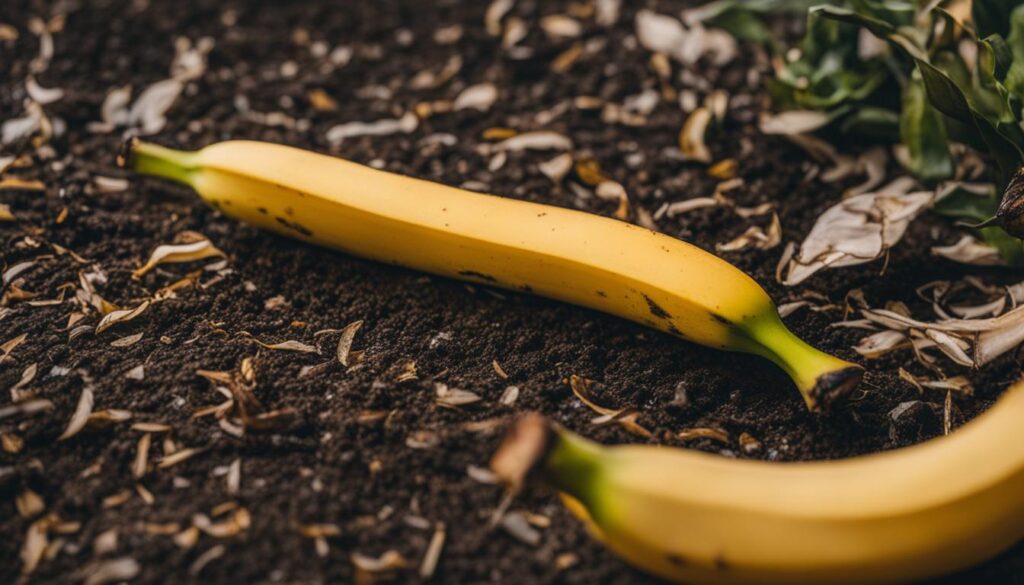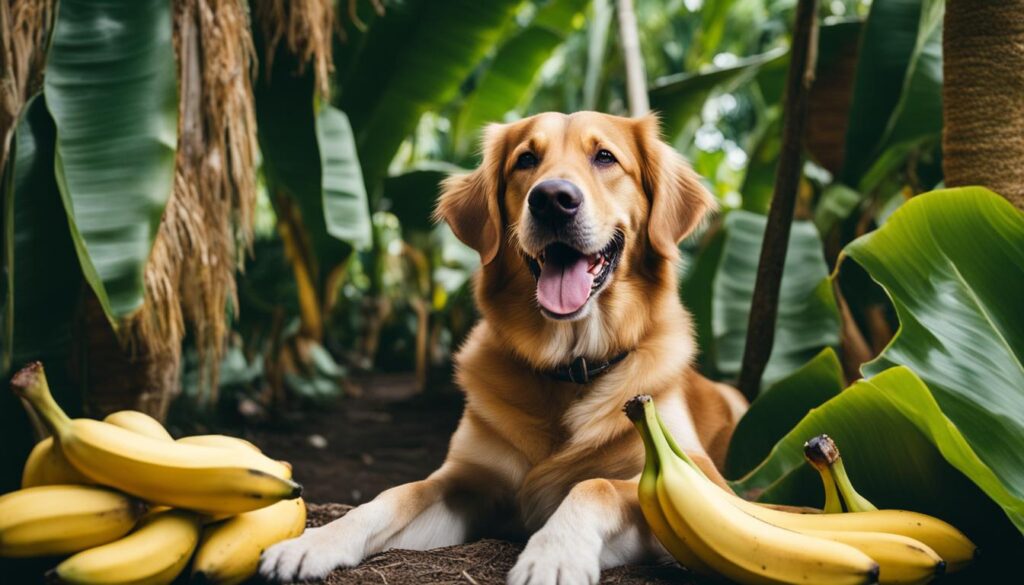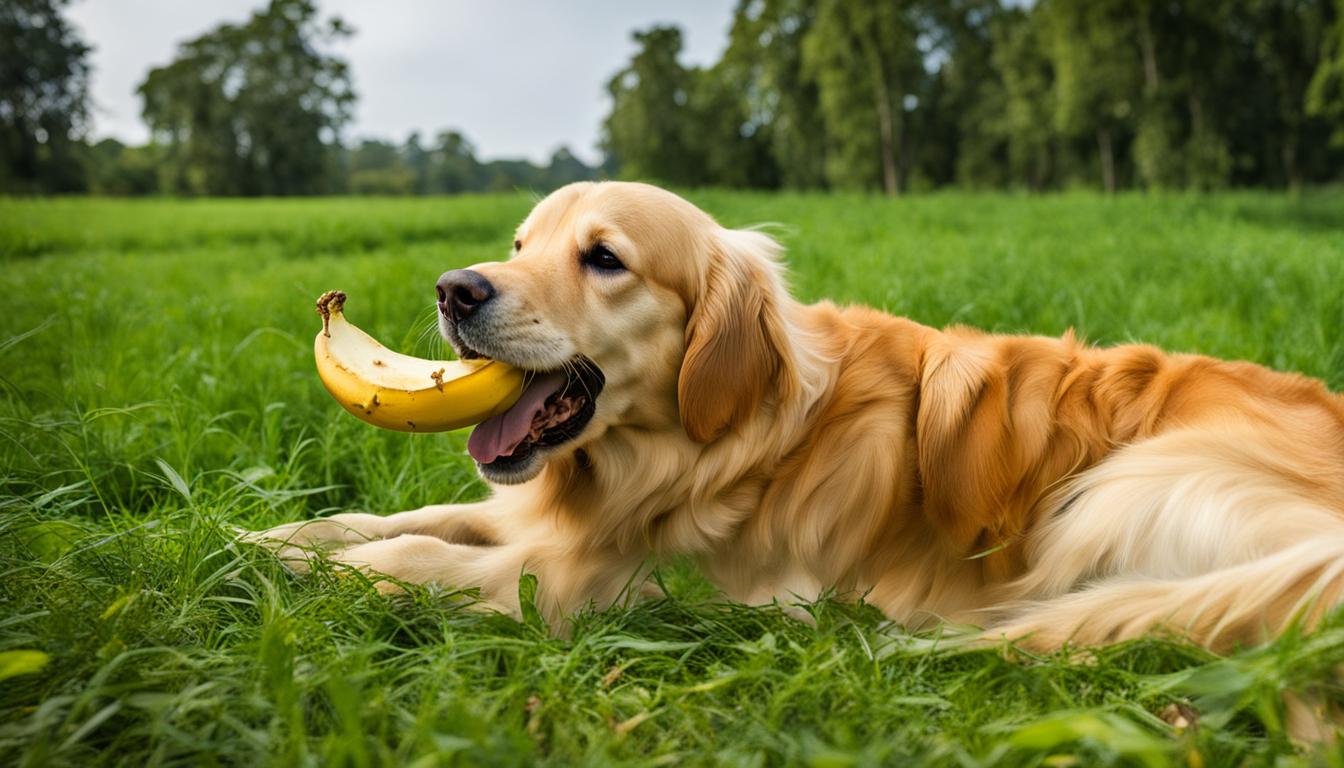Are you curious about whether it’s safe to share your favorite fruit with your furry friend? Well, you’ll be glad to know that dogs can indeed enjoy bananas as a healthy treat! In this article, we will delve into the benefits and risks of feeding bananas to dogs, providing you with all the information you need to make an informed decision.
Bananas are not only delicious, but they also offer a range of health benefits for our canine companions. High in potassium, vitamin B6, and vitamin C, bananas provide a nutritious alternative to fatty treats. Additionally, their fiber and magnesium content can aid in digestion and promote bone growth.
However, it’s important to remember that moderation is key when it comes to feeding bananas to dogs. Due to their high sugar content, bananas should only be given in small portions. It’s also crucial to keep an eye out for any signs of a banana allergy in your dog.
Before introducing any new food into your dog’s diet, it’s always best to consult with a veterinarian. They can provide personalized advice based on your dog’s specific needs and health conditions.
Key Takeaways:
- Feeding dogs bananas in moderation can provide them with essential nutrients such as potassium and vitamins.
- Monitor your dog for any signs of a banana allergy.
- Consult with a veterinarian for guidance on portion sizes and incorporating bananas into your dog’s diet.
- Bananas should not be a primary source of nutrition and should be given as occasional treats.
- Always prioritize your dog’s overall health and consult with a professional before making significant changes to their diet.
Can Dogs Eat Banana Peels?

When it comes to feeding bananas to your furry friend, it’s important to know whether dogs can eat banana peels. While banana peels are not toxic to dogs, they can be difficult for them to digest and may cause a blockage in their gastrointestinal tract. Therefore, it’s recommended to remove the peel and only feed your dog the fruit itself.
“While banana peels are not toxic to dogs, they can be difficult for them to digest and may cause a blockage in their gastrointestinal tract.”
Feeding too many bananas, including the peel, can also lead to stomach upset in dogs. It’s essential to moderate their intake and ensure that bananas are given as an occasional treat rather than a staple food in their diet.
In summary, while banana peels are not toxic to dogs, it’s best to err on the side of caution and only feed them the fruit itself. If you have any concerns about feeding bananas to your dog or need guidance on portion sizes, it’s always advisable to consult with your veterinarian for personalized advice.
How to Feed Your Dog Banana
Feeding your dog bananas is a great way to provide them with a healthy and delicious treat. There are several different ways to incorporate bananas into your dog’s diet, depending on their preferences and dietary needs.
Mashing and Mixing: One simple way to feed your dog bananas is to mash them up and mix them with their regular food. This allows your dog to enjoy the taste of bananas while still getting the nutrients from their regular diet.
Peanut Butter Combination: Another option is to combine mashed bananas with dog-safe peanut butter. This can be a tasty and nutritious treat that your dog is sure to love. Just make sure the peanut butter does not contain any artificial sweeteners like xylitol, which can be toxic to dogs.
Frozen Treats: If you want to provide your dog with a refreshing treat, you can freeze mashed bananas in a stuffable toy. This not only keeps them entertained but also helps to cool them down on hot days.
If you enjoy getting creative in the kitchen, you can even make your own homemade banana dog treats. Simply blend ripe bananas with peanut butter and mild cheese, then smear the mixture over a toy and freeze it. Your dog will love the tasty and healthy treat!
| Treat Option | Description |
|---|---|
| Mashing and Mixing | Mash bananas and mix with regular food for a simple treat. |
| Peanut Butter Combination | Combine mashed bananas with dog-safe peanut butter for a tasty treat. |
| Frozen Treats | Freeze mashed bananas in a stuffable toy for a refreshing treat. |
| Homemade Banana Dog Treats | Blend ripe bananas with peanut butter and mild cheese, smear over a toy, and freeze for a homemade treat. |
Are Bananas Good for Dogs?
When it comes to the nutritional value of bananas for dogs, they offer several benefits. Bananas are rich in potassium, vitamin C, and fiber, which can support overall health and digestion in dogs. Potassium is essential for proper muscle and nerve function, while vitamin C plays a key role in boosting the immune system. Additionally, the fiber content in bananas can aid in promoting healthy digestion for your furry friend.
However, it’s crucial to remember that bananas should not replace a balanced diet for dogs. They should be given as occasional treats or incorporated into their regular meals. While the nutritional value of bananas is beneficial, dogs still require a complete and balanced diet to meet their specific nutritional needs.
“Bananas are a healthy and delicious treat for dogs, but they should not make up the majority of their diet. They should be seen as a supplement to their regular meals,” says Dr. Amanda Johnson, a veterinarian at Paws & Whiskers Animal Hospital.
| Nutrient | Amount per 100g |
|---|---|
| Potassium | 358mg |
| Vitamin C | 8.7mg |
| Fiber | 2.6g |
It’s essential to introduce bananas into your dog’s diet gradually and monitor their digestion. Some dogs may have a sensitivity or allergy to bananas, which can lead to digestive upset. If you notice any adverse reactions, such as vomiting or diarrhea, discontinue feeding them bananas and consult with your veterinarian.

Can Dogs Eat Bananas: The Risks
While bananas are generally safe for dogs, it’s important to be aware of the potential risks associated with feeding them this fruit. The high sugar content in bananas can contribute to weight gain and other health issues if consumed in excess. Dogs that are overweight or have underlying health conditions such as diabetes should have their banana intake closely monitored or avoided altogether. Additionally, some dogs may have a banana allergy, which can manifest through symptoms like itching, hives, or gastrointestinal upset.
It’s crucial to follow the 90/10 rule when it comes to treating your dog with bananas. This means that 90% of their daily calories should come from their regular dog food, while the remaining 10% can be treats, including bananas. Moderation is key to ensure your dog’s well-being and prevent any adverse effects.
If your dog experiences digestive upset or other symptoms after consuming bananas, it’s essential to consult with a veterinarian. They can help determine the cause of the reaction and provide guidance on the best course of action for your furry friend. Remember, every dog is different, and what may be safe for one may not be suitable for another.
“While bananas are generally safe for dogs, it’s crucial to be mindful of portion sizes, potential allergies, and existing health conditions. Always consult with a veterinarian if you have any concerns or questions about feeding bananas to your dog.”
By understanding the risks associated with feeding bananas to your dog and taking appropriate precautions, you can safely incorporate this fruit into their diet as an occasional treat. As with any new food, it’s always better to err on the side of caution and seek professional advice when in doubt.
| Risks | Safety Tips |
|---|---|
| High sugar content | Feed bananas in moderation |
| Potential weight gain | Follow the 90/10 rule for treats |
| Banana allergy | Monitor for allergic reactions |
Potential Allergic Reactions
Some dogs may have a sensitivity or allergy to bananas. Common signs of an allergic reaction include itching, hives, vomiting, or diarrhea. If your dog displays any of these symptoms after consuming bananas, it’s important to stop feeding them this fruit and consult with a veterinarian for a proper diagnosis and guidance on managing the allergy.
- Monitor your dog closely after feeding them bananas for any signs of an allergic reaction.
- If an allergic reaction occurs, consult with a veterinarian for appropriate treatment and avoid feeding your dog bananas in the future.
- Consider getting your dog tested for allergies to identify any other potential triggers.
Can Dogs Eat Bananas: How to Serve
When it comes to serving bananas to your furry friend, it’s important to consider the appropriate portion size and preparation methods. While bananas are a nutritious treat for dogs, they should be given in moderation and should not replace a balanced dog food diet. Here’s how you can serve bananas to your dog:
Moderate Portion Sizes
The portion size of bananas for dogs depends on their size and dietary needs. Generally, it’s recommended to serve small pieces of banana as an occasional treat. Larger dogs can have slightly bigger portions, but always consider their overall calorie intake. Remember, too much of anything, including bananas, can lead to stomach upset or weight gain.
Peel and Cut
Make sure to peel the banana before serving it to your dog. Cut it into appropriate sizes to prevent any choking hazards and facilitate digestion. Small, bite-sized pieces are ideal for most dogs.
Freeze for Added Enjoyment
If your dog enjoys a different texture and temperature experience, try freezing the banana. Peel, cut the fruit, and place it in the freezer. Once frozen, you can give it to your dog as a refreshing treat on a hot day.
Remember, while bananas are safe for dogs, it’s always best to consult with a veterinarian before making any significant changes to your dog’s diet. They can provide personalized advice based on your dog’s specific needs and health conditions. Enjoy treating your furry friend to the occasional banana, keeping in mind the appropriate portion sizes and ensuring it’s part of a well-balanced diet.

Can Dogs Eat Bananas: A Nutritional Perspective
When considering whether dogs can eat bananas, it’s important to understand the nutritional value they offer. Bananas are a good source of potassium, vitamin B6, vitamin C, and fiber, all of which can benefit your dog’s overall health. Potassium helps regulate muscle function, vitamin B6 supports brain development, and vitamin C boosts immunity. The fiber in bananas aids digestion and promotes a healthy gut.
However, it’s crucial to remember that bananas should not replace a balanced dog food diet. While they offer some nutritional benefits, they are not a complete source of essential nutrients. Dogs require a well-rounded diet that includes a variety of proteins, fats, carbohydrates, vitamins, and minerals to meet their specific nutritional needs. Therefore, bananas should be given as occasional treats or incorporated into their regular meals in moderate amounts.
| Nutrient | Amount per 100g of Banana |
|---|---|
| Potassium | 358mg |
| Vitamin B6 | 0.367mg |
| Vitamin C | 8.7mg |
| Fiber | 2.6g |
The table above demonstrates the approximate nutritional value of bananas per 100 grams. As you can see, they are a decent source of potassium, vitamin B6, vitamin C, and fiber. However, it’s important to note that the nutrient content may vary slightly depending on the ripeness of the banana.
Before incorporating bananas into your dog’s diet, it’s always advisable to consult with a veterinarian. They can provide personalized guidance based on your dog’s specific needs, taking into account factors such as age, breed, health conditions, and dietary requirements. Your veterinarian will be able to help you determine the appropriate portion sizes and frequency of banana consumption for your furry friend.
Conclusion
So, can dogs eat bananas? Absolutely! Bananas can be a healthy and tasty addition to your furry friend’s diet. Packed with potassium, vitamin B6, vitamin C, and fiber, they offer numerous nutritional benefits. However, it’s crucial to keep a few things in mind.
First, moderation is key. While bananas are nutritious, they also contain a fair amount of sugar. To prevent weight gain and other health issues, give bananas to your dog as an occasional treat, following the 90/10 rule.
If you’re feeling creative, consider whipping up some homemade banana dog treats. By blending ripe bananas with dog-safe peanut butter and mild cheese, you can create delicious and healthy snacks for your pup to enjoy.
Lastly, be aware of any potential allergies or digestive issues your dog may have. If your furry friend experiences any adverse reactions after eating bananas, consult with a veterinarian for guidance and personalized advice.
FAQ
Can dogs eat bananas?
Yes, dogs can eat bananas in moderation. They are high in potassium, vitamin B6, and vitamin C, making them a healthy treat option.
Are bananas safe for dogs with banana allergies?
Some dogs may have a banana allergy, so it’s important to monitor their reaction. If your dog shows any signs of an allergic reaction, it’s best to avoid feeding them bananas.
What is the appropriate portion size of bananas for dogs?
The portion size of bananas for dogs depends on their size and dietary needs. It’s best to consult with a veterinarian to determine the appropriate portion size for your dog.
Can dogs eat banana peels?
While banana peels are not toxic to dogs, they are hard to digest and may cause a blockage. It’s best to remove the peel and only feed your dog the fruit itself.
How can I incorporate bananas into my dog’s diet?
There are several ways to incorporate bananas into your dog’s diet. You can mash them up and mix them with their regular food, combine them with dog-safe peanut butter, or freeze them in a stuffable toy for a refreshing treat.
Are bananas a complete source of nutrition for dogs?
No, bananas are not a complete source of essential nutrients for dogs. They should be given as occasional treats and not as a primary source of nutrition.
Are there any risks in feeding bananas to dogs?
Feeding too many bananas can lead to stomach upset in dogs. Additionally, dogs with banana allergies should avoid this fruit altogether. Monitor your dog’s digestion and consult with a veterinarian if you have any concerns.
How should I serve bananas to my dog?
Peel the banana and cut it into appropriate portion sizes based on your dog’s size and dietary needs. If your dog doesn’t enjoy fresh bananas, you can try freezing them for a different texture and temperature experience.





